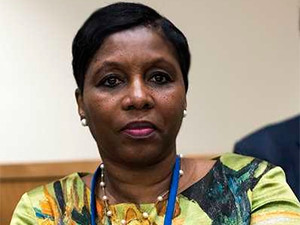
Communications minister Ayanda Dlodlo has given encryption the green light, undoing efforts by her predecessor Faith Muthambi when it comes to the country's switch from analogue to digital terrestrial television (DTT).
According to an Eyewitness News report, Dlodlo said she will introduce the encrypted form of DTT because that is what African National Congress (ANC) policy says she must do.
Dlodlo, currently attending the World Economic Forum on Africa in Durban, told the news agency she's clear on where she stands and will follow ANC policy on this and has no plans to change it.
"I'm not going to change the ANC policy unless when we get to the party conference in December. The direction is that that policy must be changed," she said.
Party politics
SA's digital migration process has been contentious throughout, characterised by missed deadlines, drawn-out legal battles, suspended production of digital TV decoders, as well as amendments to the ANC's Broadcasting Digital Migration (BDM) Policy.
In 2013, the ANC resolved to use encrypted set-top boxes (STBs) for the country's migration; however, Muthambi made amendments in terms of the type of decoders that would be used for digital TV.
Muthambi adopted the amendment that calls for the use of unencrypted STBs, which the communications department said is in line with its mandate to unconditionally provide free access to content for citizens in all corners of SA.
The amendments to the ruling party's policy resulted in a public spat between Muthambi and higher education minister Blade Nzimande, who lambasted the former communications minister for defying ANC and alliance decisions on DTT.
Nzimande was not the only party member to lock horns with Muthambi. The ANC's Jackson Mthembu called out Muthambi, saying the use of unencrypted STBs was not part of the ANC's mandate.
The then communications minister lashed out at suggestions that she defied her party's directive by opting to use unencrypted STBs.
"To either expressly or by implication allege minister Muthambi has gone against the ANC policy on digital migration amendments is patently untrue. Furthermore, it is disingenuous and a veiled attack on the integrity of minister Muthambi to seek to suggest the minister may have been successfully lobbied by any group of interested parties," the Department of Communications (DOC) said at the time.
Legal battle
Muthambi's decision to amend the BDM policy was challenged in the courts by Etv.
The free-to-air television broadcaster wants digital migration decoders to be encrypted, a move that has been questioned and labelled as a future "business plan" for the broadcaster, which is speculated to want to move away from its free-to-air model.
Last year, the Supreme Court of Appeal held that a clause of an amendment to the policy was unlawful and invalid.
Despite the judgement, Muthambi - and other interested parties that oppose encryption for government-subsidised STBs - approached the Constitutional Court (ConCourt) and filed applications for leave to appeal.
The ConCourt is still to decide on the legal matter regarding the technical specifications of digital TV decoders.
Playing catch-up
SA missed the June 2015 deadline set by the International Telecommunication Union for countries to switch from analogue to DTT.
After missing this cut-off date, the DOC began the digital migration process in border-lying towns, as these households require the use of encrypted STBs for DTT.
The department is working together with the SA Post Office to reach communities and distribute the subsidised television decoders to qualifying households.
To qualify for the government-subsidised decoders, television viewing households must earn less than R3 200 per month, according to the DOC.
Government has committed to giving five million subsidised STBs to poor TV-owning households.
Share